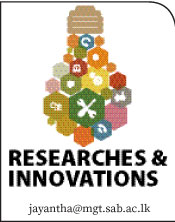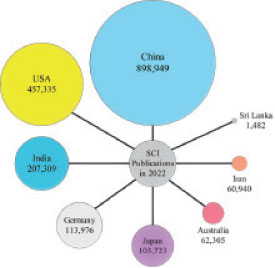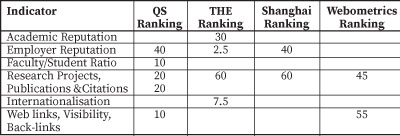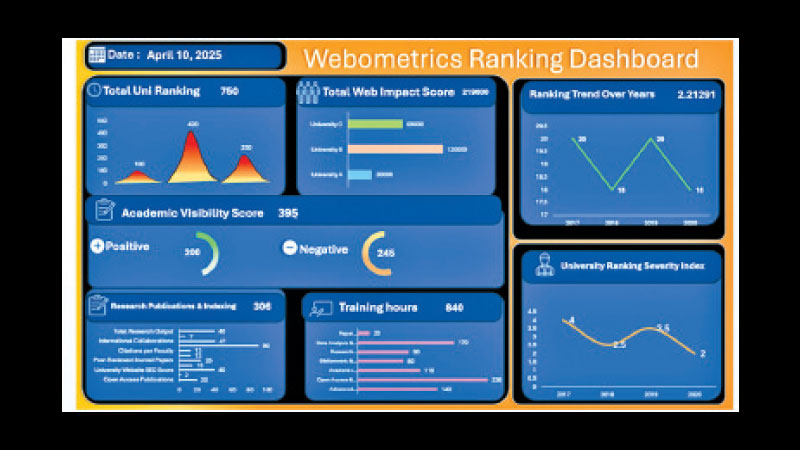 University rankings play a crucial role in assessing higher education quality, influencing student choices, institutional reputations, and even government funding. They provide a comparative framework to evaluate universities based on factors such as academic reputation, research output, faculty expertise, international diversity, and graduate employability. For students, university rankings provide the best service as a guide to selecting top-tier institutions, while universities use them to benchmark performance and attract talent. Governments, administrative bodies, funding sources and policymakers also rely on rankings to allocate resources and improve national education standards. However, rankings should be interpreted critically, as different systems measure excellence in varying ways.
University rankings play a crucial role in assessing higher education quality, influencing student choices, institutional reputations, and even government funding. They provide a comparative framework to evaluate universities based on factors such as academic reputation, research output, faculty expertise, international diversity, and graduate employability. For students, university rankings provide the best service as a guide to selecting top-tier institutions, while universities use them to benchmark performance and attract talent. Governments, administrative bodies, funding sources and policymakers also rely on rankings to allocate resources and improve national education standards. However, rankings should be interpreted critically, as different systems measure excellence in varying ways.
University rankings are essential tools for students, academics, and policymakers to assess higher education institutions worldwide. Various ranking systems evaluate universities using different methodologies, each emphasising distinct aspects of academic excellence. Below are the four most influenced and widely considerable university ranking systems.
* QS (Quacquarelli Symonds) Ranking
* THE (Times Higher Education) Ranking
* Shanghai Ranking
* Webometrics Ranking

Figure 2. Number of Publications by different nations
The most important sections for each university ranking system are given in Table 1. However, there are some common points and categories for all four rankings which are Research and Publications as well as the number of citations received for university publications and staff.
Table 1: Comparison of University Rankings (Percentage of each indicator)
Out of all given ranking systems, all national universities are following the webometrics ranking procedure.
Webometrics Ranking
The Webometrics Ranking of World Universities, also known as the Web of Universities, is a global ranking system that evaluates universities based on their online presence and digital impact. Established in 2004 by the Cybermetrics Lab (a research group under the Spanish National Research Council, CSIC), this ranking emphasises the role of the internet in academic knowledge dissemination. Unlike traditional rankings that focus on research output or reputation, Webometrics assesses how effectively institutions share knowledge through the web.
The most important part of the webometrics ranking is research and publication which is directly linked to the number of citations. The ranking assesses institutional web presence through quantitative metrics including primary domains, subsidiary pages, document archives, and research outputs available online.
University strengthens digital presence through webometrics Insights
 The newly introduced Webometrics Ranking dashboard offers a depth view of the university’s expanding online and scholarly impact. This analytical dashboard emphasises how organisations are faring in aspects like digital presence, research visibility, global opportunity, and education. The dashboard indicates that the university has made significant progress in improving its academic visibility, especially with more research publications and wider international collaborations. A significant takeaway is the university’s emphasis on boosting its online presence, fueled by teamwork between departments and better website optimisation. Training programs have also been crucial, as faculty members participate in professional development activities that include research communication and open-access publishing. These initiatives aim to equip personnel with the abilities needed to succeed in the digital educational environment. This dashboard functions not only as a performance report but also as a guide for additional growth in the international academic arena. The university’s dedication to openness, creativity, and teamwork persists in propelling its advancement in digital education.
The newly introduced Webometrics Ranking dashboard offers a depth view of the university’s expanding online and scholarly impact. This analytical dashboard emphasises how organisations are faring in aspects like digital presence, research visibility, global opportunity, and education. The dashboard indicates that the university has made significant progress in improving its academic visibility, especially with more research publications and wider international collaborations. A significant takeaway is the university’s emphasis on boosting its online presence, fueled by teamwork between departments and better website optimisation. Training programs have also been crucial, as faculty members participate in professional development activities that include research communication and open-access publishing. These initiatives aim to equip personnel with the abilities needed to succeed in the digital educational environment. This dashboard functions not only as a performance report but also as a guide for additional growth in the international academic arena. The university’s dedication to openness, creativity, and teamwork persists in propelling its advancement in digital education.
The subsequent figure reflects this indicator, showing the university’s visibility among the main parameters including total ranking, visibility score, web impact, productive research, and training hours.
Indexed publications around the world
 In 2022, Sri Lanka produced only 1,482 Scopus-indexed research publications, a clear contrast to countries like Australia, which recorded 62,305 publications despite having a population size almost similar to Sri Lanka. This highlights a significant gap in research output relative to national potential. While nations such as China and the United States lead with hundreds of thousands of papers, Sri Lanka remains far behind in contributing to global scientific discourse. The comparison with Australia emphasises the importance of strategic investment in research infrastructure, academic incentives, and policy reform to elevate Sri Lanka’s presence in international scientific publishing and innovation.
In 2022, Sri Lanka produced only 1,482 Scopus-indexed research publications, a clear contrast to countries like Australia, which recorded 62,305 publications despite having a population size almost similar to Sri Lanka. This highlights a significant gap in research output relative to national potential. While nations such as China and the United States lead with hundreds of thousands of papers, Sri Lanka remains far behind in contributing to global scientific discourse. The comparison with Australia emphasises the importance of strategic investment in research infrastructure, academic incentives, and policy reform to elevate Sri Lanka’s presence in international scientific publishing and innovation.
Strategies to improve ranking
Although the webometrics ranking system takes multiple factors into account, research and publications are crucial in the assessment. For instance, universities should collaborate with international institutions and industries to organise global conferences. This will not only feature the conference weblink on their websites but also create a backlink to the university, enhancing visibility. Additionally, well-structured summer workshops, open seminars, industry meetings, and knowledge-sharing events should be held to showcase researchers’ notable accomplishments.
University should motivate both undergraduate and postgraduate students to develop their own blogs, websites, and content linked to the university. These can focus on their academic disciplines or address nationally significant topics. While citations from a university’s top 10 researchers do not influence webometrics rankings—ensuring fairness for all global institutions, except those top scholars—those ranked 11th to 110th on Google Scholar must intensify their research efforts to increase citations.Additionally, the top 10 scholars should collaborate with others on the list to enhance visibility and access to their work. Rather than focusing solely on individual publications, joint research should be prioritised.
For example, a single-author paper with 10 citations contributes only 10 citations to the university. However, if five scholars (outside the top 10) co-author a paper, those same 10 citations would count as 50 for the university, significantly boosting its research impact.
Universities and research councils should prioritise critical national and global issues as key research focus areas. These may include sustainable development, waste-to-energy conversion, energy crises, renewable energy, and environmental pollution, among others, to enhance international recognition and citation of their publications. Additionally, research findings should be made widely accessible through open-access journals and conference proceedings. Even if the work is published in conference proceedings, researchers should upload their articles to platforms like ResearchGate, Academia.edu, and ORCID to increase visibility. Google Scholar will automatically index these publications and incorporate them into the researcher’s profile, ensuring updates are reflected.
To promote research and development in Sri Lanka, government policies should allocate R&D funds to both research institutes and higher education institutions based on their number of Scopus-indexed publications, without distinguishing between private and state universities.
Ultimately, regardless of institutional type, all contribute to Sri Lanka’s research output, which impacts international university rankings and national prestige. Currently, the country’s publication count in indexed journals is far below that of nations with comparable populations—a critical issue that must be addressed for national progress and global educational standards. By improving university rankings through enhanced research, Sri Lanka can attract more international students, boosting foreign revenue. Thus, the government must revise its policies to support all universities, both public and private, fostering research and publications that drive national development.
By: Dr. Udara S.P.R. Arachchige, Chamil Gunarathna, Vihanga Senevirathne, Chamodya Nirmal
Faculty of Engineering, NSBM Green University, Sri Lanka




